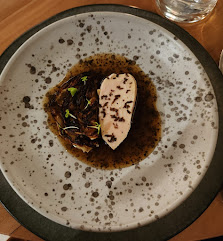The last time the Chee's or Frankie and Teresa came back to KK was in February 2014, exactly ten years ago. I managed to organize a reunion lunch for them to meet up with our former classmates at one of the local Chinese Restaurants (Read here).
In August 2017 when my wife and I toured Canada, we also met up with the couple in Vancouver before we started our driving tour to the Rockies (Read here).
 |
Taken in front of the Chee's house in Vancouver during our August 2017 visit to Canada. |
**************************************************
In September 2022, I was informed by Teresa that her husband, Frankie underwent a kidney transplant in a Vancouver hospital on 18 September 2022. The operation was a success. He no longer needs to go thrice weekly for the dialysis. Quality of life has improved.
Frankie was discharged from the Hospital on 23 Sep 2022, five days after the operation.
***********************************************
Earlier in late December 2023, Teresa whatsApp me that a huge 3-generation group would be visiting Sabah in conjunction with the CNY 2024. The trip would be two-week duration from 4 to 19 February 2024.
Sadly, Frankie was not able to join the group. According to Teresa, such long trip away from home would be too demanding on him.
Teresa's trip program was jammed-packed with activities. Besides KK, the group toured many places - Membakut, Kudat and Kudasang.
I managed to find a slot of just two and half hours in the afternoon of 18 February, the day before they flew back to Canada to meet up. I also managed to get another former classmate, Jeannie within very short notice to join us. Within this short time, we managed to visit our old school at the Signal Hill and had coffee at the popular outlet, Kedai Kopi Fook Yuan.
We visited our old Lok Yuk School at Signal Hill. We were once classmates in this old school and had spent one and a half years together from 1965 to mid 1966 in Form 1 to middle of Form 2. In August 1966, Lok Yuk School moved to the new school at Likas. The old school premise later on became the campus of the Sabah Theological Seminary.
(Left photo) Terasa and Jeannie taken in front of main entrance to Sabah Theological Seminary. (Right photo) An old photo of the entrance signboard to the old school.
****************************************************
We paused to take a look at the old earth trail winding along the hillside - a path once trodden daily by students making the climb from the foot of the hill to the school grounds.
Seeing a former classmate now leaning on a walking stick stirred a wave of nostalgia tinged with empathy. Sixty years have passed since she last walked that trail; today, it is doubtful she could manage it again.
The moment was bittersweet - memories of youthful days came rushing back: the boundless energy we once had, the laughter we shared, and the friendships that shaped us. Yet, it was also a quiet reminder of the relentless passage of time and the delicate, fleeting nature of life.
************************************************
(Top photo) We stopped by the corridor of the old Chapel where (Bottom 2 photos) we had spent countless times during school recess in 1965-1966.
**************************************************
(Top photo) At the open space where (Bottom 2 photos) students used to have morning school assembly in the 1960s.
(Top photo) We walked down the staircase, (bottom photo) just as students did in the 1960s. Back then, climbing and descending the staircase numerous times were a daily ritual.
At this stage of our lives, we are grateful for a past we can revisit - a past that stirs smiles, rekindles fond memories, and reminds us of the life lessons we once learned. We are thankful, too, for a present we can still savour, and for a future that holds the promise of new moments to cherish.
Who knows - perhaps our paths will cross again, somewhere, on another beautiful day.












.JPG)




.jpg)












.jpg)
.jpg)

~2.jpg)



.jpg)











